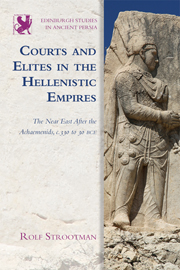Book contents
- Frontmatter
- Contents
- List of Illustrations
- Acknowledgements
- Abbreviations
- The Hellenistic Dynasties
- Series Editor's Preface
- Map
- Introduction: Court and Empire in the Hellenistic Near East
- PART I SETTING THE SCENE
- PART II THE COURT AS A SOCIO-POLITICAL SYSTEM
- PART III CEREMONIAL AND RITUAL
- 9 Ceremonial and Protocol
- 10 Death and Resurrection: Inauguration Ritual
- 11 The Royal Entry
- 12 Royal Processions: Enacting the Myth of Empire
- Conclusion
- Bibliography
- Index
11 - The Royal Entry
from PART III - CEREMONIAL AND RITUAL
Published online by Cambridge University Press: 05 September 2014
- Frontmatter
- Contents
- List of Illustrations
- Acknowledgements
- Abbreviations
- The Hellenistic Dynasties
- Series Editor's Preface
- Map
- Introduction: Court and Empire in the Hellenistic Near East
- PART I SETTING THE SCENE
- PART II THE COURT AS A SOCIO-POLITICAL SYSTEM
- PART III CEREMONIAL AND RITUAL
- 9 Ceremonial and Protocol
- 10 Death and Resurrection: Inauguration Ritual
- 11 The Royal Entry
- 12 Royal Processions: Enacting the Myth of Empire
- Conclusion
- Bibliography
- Index
Summary
This is the first of two chapters discussing the pomp and pageantry of courtly ritual. We will first take a closer look at the ceremonial entries of kings into cities. The context will be kings visiting subjects. Chapter 12 will deal with centralised royal ritual; here the focus will be on subjects visiting the king. The main premise underlying the present discussion is that in entering particular cities Hellenistic kings played a variety of cultural roles – Egyptian, Greek, Judaean, Phoenician – but these roles were not necessarily ‘traditional’: tradition was constantly renegotiated, and manipulation by both parties of the formal aspects of the rituals ordering the royal entry was part of the bargaining process that determined the relationship of city and empire. The two forms of rituals, both involving a procession, overlapped: the Grand Procession of Ptolemy Philadelphos in Alexandria Chapter 12) was both a central event emanating from the palace and a ritual of entry, in which the king was equated with Dionysos victoriously returning from the east.
RITUALS OF ENTRY
Macedonian supremacy in the eastern Mediterranean was largely founded on the support of cities. A city was the key to routine access to the military resources of its hinterland. The ritual of entry into a city was therefore of prime importance, since it strengthened the bond between monarchy and town.
- Type
- Chapter
- Information
- Courts and Elites in the Hellenistic EmpiresThe Near East After the Achaemenids, c. 330 to 30 BCE, pp. 233 - 246Publisher: Edinburgh University PressPrint publication year: 2014



